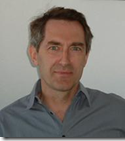Philip Schofield, Bentham Project, Faculty of Laws, University College London
Jeremy Bentham and the Computer Age: Reflections on Crowdsourcing the Transcription of Handwritten Documents
Jeremy Bentham (1748–1832), the English philosopher and reformer, is known as the founder of utilitarianism, the doctrine that states that the right action is that which promotes the greatest happiness of the greatest number. The Bentham Project was established at UCL in 1959 in order to produce a new authoritative edition of Bentham’s Collected Works, based in part on printed materials, but also on over 70,000 manuscript folios deposited mainly in UCL Library. To date, thirty volumes out of a projected eighty have been published in the new edition.
I will show that Bentham himself was a great innovator in terms of the use of new technology, and that some of his schemes, for instance conversation tubes in his planned panopticon prison, would make much more sense in today’s age of digital communication.
I will then describe the use of new technology in the Bentham edition, from the first use of computers in 1985 to transcribe manuscripts, through to our scholarly crowdsourcing platform Transcribe Bentham (TB) and involvement in the tranScriptorium project, which is developing software that will transcribe handwritten historical documents. TB was launched in 2010, and by March 2014 over 7,000 documents had been transcribed and tagged to a very high standard by volunteers.
I will reflect, from the perspective of an academic in the humanities, on the challenges and opportunities that have arisen in attempting to embed new technology in a traditional scholarly publishing programme, and try to assess the respective costs and benefits.
Biography
Philip Schofield is Professor of the History of Legal and Political Thought in the Faculty of Laws and Director of the Bentham Project, University College London. He is General Editor of the new authoritative edition of The Collected Works of Jeremy Bentham, and has edited or co-edited nine volumes in the series. As well as a series of articles and book chapters, he has published two monographs on Bentham: Utility and Democracy: the political thought of Jeremy Bentham, Oxford University Press (2006), winner of the WJM Mackenzie Book Prize awarded by the UK’s Political Studies Association; and Bentham: A Guide for the Perplexed, Continuum (2009).
Hans-Leo Teulings, NeuroScript, Tempe, Arizona, USA
Handwriting: New Times, New Needs
Handwriting is a fine motor skill. It is the most taught motor skill in the world. It is getting less and less attention as compared to recreative motor skills and sports. Today we enjoy affordable mobile computers, touch tablets, virtual keyboards, spelling and grammar correctors, and speech-to-text recognition. Handwritten signatures are getting out of fashion in favour of other personal identification methods. Will the skill of handwriting become a historic skill? We foresee an upswing in the use of handwriting. The newest mobile devices will be standard equipped with the amazingly versatile pens. Even finger gesture can now be recorded. Handwriting in note taking could regain and important role in advanced education. Handwriting recording and analysis offers a cost-effective window into the functioning of the nervous system. It is used in fundamental research and in medical applications. We will present measures of handwriting skill in schools. If we wish to contribute with handwriting processing in today’s society we need to identify today’s needs for online and offline handwriting processing. There will be a need for easy to demonstrate, generic mobile pen applications.
Biography
Hans-Leo Teulings received an MSc in experimental physics and biophysics and a PhD in experimental psychology at the University of Nijmegen, The Netherlands. During more than 30 years he pioneered handwriting movement recording. He contributed to grants and research papers while working at the universities of Nijmegen, Trondheim (Norway), Cambridge (UK), Genoa (Italy), Madison (Wisconsin, USA), and Tempe (Arizona, USA). Since 1997 he is CEO of NeuroScript. This company’s mission is to support researchers worldwide with developing handwriting applications, e.g., using the MovAlyzeR handwriting recording and analysis platform.


